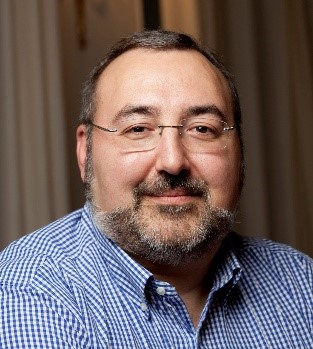INSTITUTE SEMINAR
Transcriptomic alterations in APP/PS1 mice astrocytes lead to early postnatal axon initial segment structural changes
Speaker
Juan José Garrido
Date and time
March 7th 2025 12.30 hrs.
Place
Cajal Institute
Abstract
Alzheimer´s disease (AD) is characterized by neuronal function loss and degeneration. The integrity of the axon initial segment (AIS) is essential to maintain neuronal function and output. AIS alterations are detected in human post-mortem AD brains and mice models, as well as, neurodevelopmental and mental disorders. However, the mechanisms leading to AIS deregulation in AD and the extrinsic glial origin are elusive. We studied early postnatal differences in AIS cellular/molecular mechanisms in wild-type or APP/PS1 mice and combined neuron-astrocyte co-cultures. We observed AIS integrity alterations much earlier than amyloid plaques or tau tangles can be detected in the presence of APP/PS1 astrocytes, that showed reduced mRNAs and protein levels of retinoic acid synthesis enzymes, as well as ADNP (Activity-dependent neuroprotective protein). AIS alterations were recovered by impeding retinoic acid degradation, Adnp-derived NAP peptide (NAPVSIPQ) addition or P2X7 receptor inhibition, both regulated by retinoic acid levels. Our findings extend current knowledge on AIS regulation, providing data to support the role of astrocytes in early postnatal AIS modulation. In conclusion, AD onset may be related to very early glial cell alterations that induce AIS and neuronal function changes, opening new therapeutic approaches to detect and avoid neuronal function loss.
Affiliation and short bio

Juan José Garrido is a Spanish National Research Council (CSIC) staff scientist and Head of Axon Initial Segment Lab at the Cajal Institute (Madrid, Spain). He studied at Complutense University (Madrid) and received his PhD in 1997 at the University of Valladolid. He performed his post-doctoral training from 1998 to 2002 at INSERM in the group of Dr. Benedicte Dargent (Marseille, France) and from 2003 to 2005 at Centro de Biología Molecular, CSIC-UAM (Madrid) in the group of Dr. Wandosell. Since 2005 he has worked as a principal investigator at the Department of Cellular, Molecular, and Developmental Neuroscience. Garrido lab is focused on understanding the cellular and molecular mechanisms that control the formation and maintenance of the axon initial segment (AIS) in physiological and pathological environments. The AIS is essential to maintaining neuronal function and survival, being the place of action potential generation and the structure that maintains neuronal polarization. His results have contributed to deciphering cellular and molecular mechanisms involved in axonal growth and axon initial segment maintenance in physiological and pathological conditions.
Related publications with the topic
- Transcriptomic alterations in APP/PS1 mice astrocytes lead to early postnatal axon initial segment structural changes. Benitez MJ, Retana D, Ordoñez-Gutiérrez L, Colmena I, Goméz MJ, Álvarez R, Ciorraga M, Dopazo A, Wandosell F, Garrido JJ. Cell Mol Life Sci. 2024;81(1):444. doi: 10.1007/s00018-024-05485-9.
- Contribution of Axon Initial Segment Structure and Channels to Brain Pathology. Garrido JJ. Cells. 2023 12(8):1210. doi: 10.3390/cells12081210.
- Formin Activity and mDia1 Contribute to Maintain Axon Initial Segment Composition and Structure. Zhang W, Ciorraga M, Mendez P, Retana D, Boumedine-Guignon N, Achón B, Russier M, Debanne D, Garrido JJ. Mol Neurobiol. 2021, 58(12):6153-6169. doi: 10.1007/s12035-021-02531-6.
- ATP-P2X7 Receptor Modulates Axon Initial Segment Composition and Function in Physiological Conditions and Brain Injury. Del Puerto A, Fronzaroli-Molinieres L, Perez-Alvarez MJ, Giraud P, Carlier E, Wandosell F, Debanne D, Garrido JJ. Cereb Cortex. 2015;25(8):2282-94. doi: 10.1093/cercor/bhu035.
